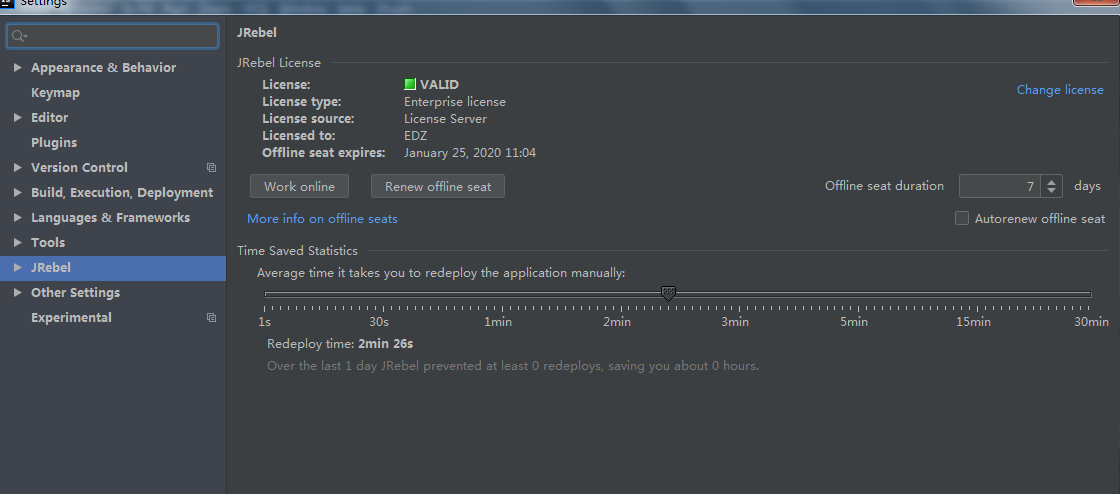
- #Jrebel license file how to
- #Jrebel license file update
- #Jrebel license file code
- #Jrebel license file zip
- #Jrebel license file download
Replace with the name of jar file downloaded in step number 3.
#Jrebel license file download
Download latest release of Hotswap agent jar, and put it inside your hybris/bin/platform/resources/hotswap/ (Create hotswap folder, If not present).Look at the below screenshot for reference. Make sure that CMD have write access(Run as Administrator) to the java installation directory. Select required java installation directory from the dialog box and press “Install DCEVM as altjvm” button. To launch DCEVM on Windows: Start > cmd > right click > Run As Administrator and use: java -jar g.Download latest release of DCEVM Java patch.Step by Step guide to setup Hotswap with Hybris.
#Jrebel license file how to
How to Setup HotSwap agent with Hybris project? Please note that Hierarchy change is still not supported in HotSwap + DCEVM.
#Jrebel license file code
In contrast to standard Java, where the HotSwap is limited to in-body code changes, the DCEVM + HotswapAgent allow following code changes: Server restart is not required for each code change. loading the code changes directly in the running server. HotSwap does exactly the same thing what JRebel does, i.e.

HotSwap is free and open source alternative to JRebel. Problem with JRebel is, it is not free to use and pretty expensive.įree and open source alternative to JRebel is HotSwap. In simple words JRebel loads the code changes in the live running server, server restart is not required at all. JRebel helps developers to be more productive by viewing code changes in real time and maintaining state. JRebel fast tracks Java application development by skipping the time-consuming build and server restart steps in the development process. Many Hyrbis developers are aware of JRebel. Even if one-line code change is done, developer has to wait for around an hour to see the output of the changes. Subsequently, restarting the Hybris server to load the changes.īuilding Hybris project usually takes 20 minutes and restarting server on windows machine takes around 25 to 35 minutes. On the other hand with Hybris, it is always necessary to rebuild the source code in bytecode.
#Jrebel license file update
It is already added to our parent project POMs (in the env-development profile), so all you have to do is to update your SVN folders and rebuild the packages that you want to use with JRebel.Īdditional Eclipse debug configuration There is a Maven Plugin available which automatically creates this rebel.xml for our projects. For additional files and directories a config file named "rebel.xml" is required that describes these paths. JRebel has to know which class and resource files it should watch for changes. Add the above line (with your JRebel path) to the VM arguments.Ĭonfiguration of development/build environment.Double click on the server, a settings window will open.noverify -javaagent:c:\programme\javarebel-2.0.3\jrebel.jar Configuration of JBoss in Eclipse

Replace the path with your individual complete path to the jrebel.jar file.

#Jrebel license file zip
Unpack the zip to an arbitrary directory.Luckily, we could convince them of our projects and got free one-year licenses for the OSS-committers at Max Planck Digital Library. JRebel is not free, but supports Open source Projects. This table shows what you can now do without a complete redeployment. It watches for changes in the class and resource files and maps them directly to the application server. JRebel is a great tool that bridges this gap. Unfortunately, Eclipse and other development environments do not support incremental hot deployment in combination with different application servers. This can get very time-consuming and annoying. Whenever you make a change to your Java code or your JSP/ JSF page, you have to rebuild and redeploy the complete application in order to see or debug the changes. 4.1 Additional Eclipse debug configuration.4 Configuration of development/build environment.


 0 kommentar(er)
0 kommentar(er)
